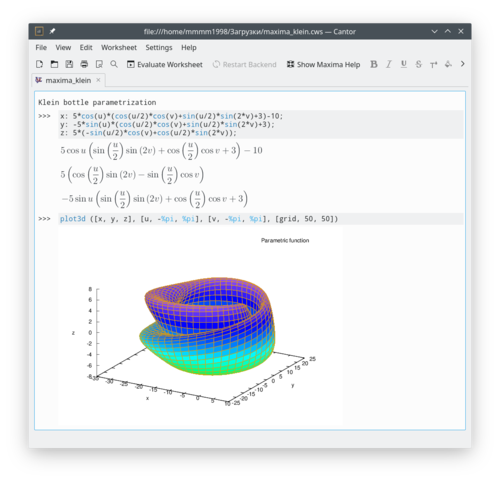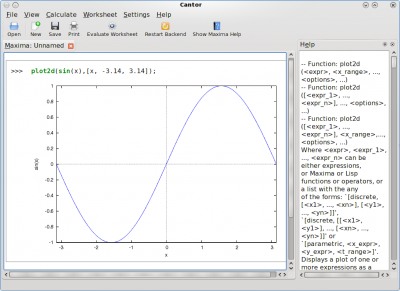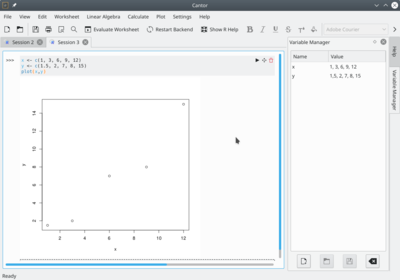Cantor: Difference between revisions
(update cantor informations) |
(Marked this version for translation) |
||
| Line 44: | Line 44: | ||
[[Image:Cantor_R_plot.png|thumb|400px|center| ''Sample plot using R-backend'']] | [[Image:Cantor_R_plot.png|thumb|400px|center| ''Sample plot using R-backend'']] | ||
==More Information== | ==More Information== <!--T:15--> | ||
<!--T:13--> | <!--T:13--> | ||
* [http://docs.kde.org/?language=en&application=cantor Cantor Handbook] | * [http://docs.kde.org/?language=en&application=cantor Cantor Handbook] | ||
<!--T:16--> | |||
* [https://edu.kde.org/cantor/ Project webpage] | * [https://edu.kde.org/cantor/ Project webpage] | ||
<!--T:17--> | |||
* [https://en.wikipedia.org/wiki/Cantor_(software) Wikipedia] | * [https://en.wikipedia.org/wiki/Cantor_(software) Wikipedia] | ||
Revision as of 20:01, 26 January 2019
Home » Applications » Education » Cantor

|
Cantor is a GUI for fancy computer algebra systems (CAS).
It is part of the KDE Education Project. |

Description
Cantor is an application that lets you use your favorite mathematical applications from within a nice KDE-integrated Worksheet Interface. It offers assistant dialogs for common tasks and allows you to share your worksheets with others.
Eleven backends are currently available: Julia, Lua, Maxima, GNU Octave, python2, python, Qalculate, Sage, Scilab, R and KAlgebra.
Features
- Nice Worksheet view for evaluating expressions
- View of plotting results inside the worksheet or in a separate window
- Easy plugin based structure to add different backends
- GetHotNewStuff integration to upload/download example worksheets
- Typesetting of mathematical formulas using LaTeX
- Backend aware syntax highlighting
- Plugin based assistant dialogs for common tasks (like integrating a function or entering a matrix)
Screenshots


